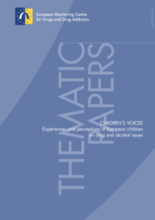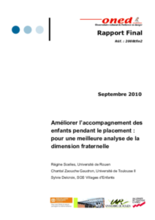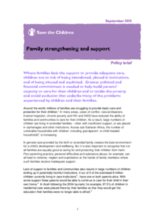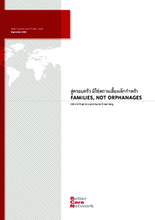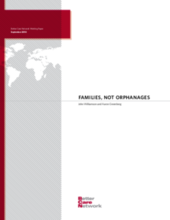Displaying 13281 - 13290 of 14579
The Chief of Party is responsible for the overall coordination and management of a large USAID/PEPFAR program serving orphans and vulnerable children (OVC).
Retrak Ethiopia, with support from UNICEF and members from the Ministry of Women’s and Children’s Affairs, held a 4 day training aimed to equip the participants with the skills necessary to assess potential carers, match the children with the right carers, train and follow-up the carers and children, and look at some of the key issues around attachment, origins and children’s behavior.
The purpose of this paper is to give meaning and insight into some of the key drug and alcohol issues that affect children from the perspectives of the children themselves. Research shows that large numbers of children who are separated from their parents are particularly vulnerable to developing drug and alcohol problems. Special attention is paid throughout the report on children looked after by relatives, foster carers, and institutions.
For this investigation, reporters posed as a minister and a business woman to witness cases of child abuse that have claimed the lives of some children in a children's home in Ghana.
In this study, data from 60 nationally representative household surveys (36 countries) were analyzed to establish if orphanhood and adult household illness consistently identified children with worse outcomes and also to identify other factors associated with adverse outcomes for children.
SOS Villages d'Enfants a décidé de proposer une étude visant à aider les professionnels à travailler mieux avec la fratrie en les dotant d’outils d’analyse et d’évaluation. En effet, dans un contexte où une meilleure évaluation des situations des enfants est recherchée par tous, aucune recommandation précise n’existe pourtant pour permettre d’intégrer les relations fraternelles dans l’évaluation des besoins des enfants.
Call for greater political and financial commitment to help build parents’ capacity to care for their children and to tackle the poverty and social exclusion that underlie many of the problems experienced by children and their families.
A fact-finding report on the fleeing of juveniles from the Government Observation Home, Special Home and Children’s Home (Combined) for Boys at Berhampur under Ganjam District of Orissa on 21-22 September 2010
With particular attention to lower income countries, Families, Not Orphanages examines the mismatch between children’s needs and the realities and long-term effects of residential institutions.
With particular attention to lower income countries, this paper examines the mismatch between children’s needs and the realities and long-term effects of residential institutions. The paper examines available evidence on the typical reasons why children end up in institutions, and the consequences and costs of providing this type of care compared to other options. The paper concludes with a description of better, family-based care alternatives and recommendations for policy-makers.

